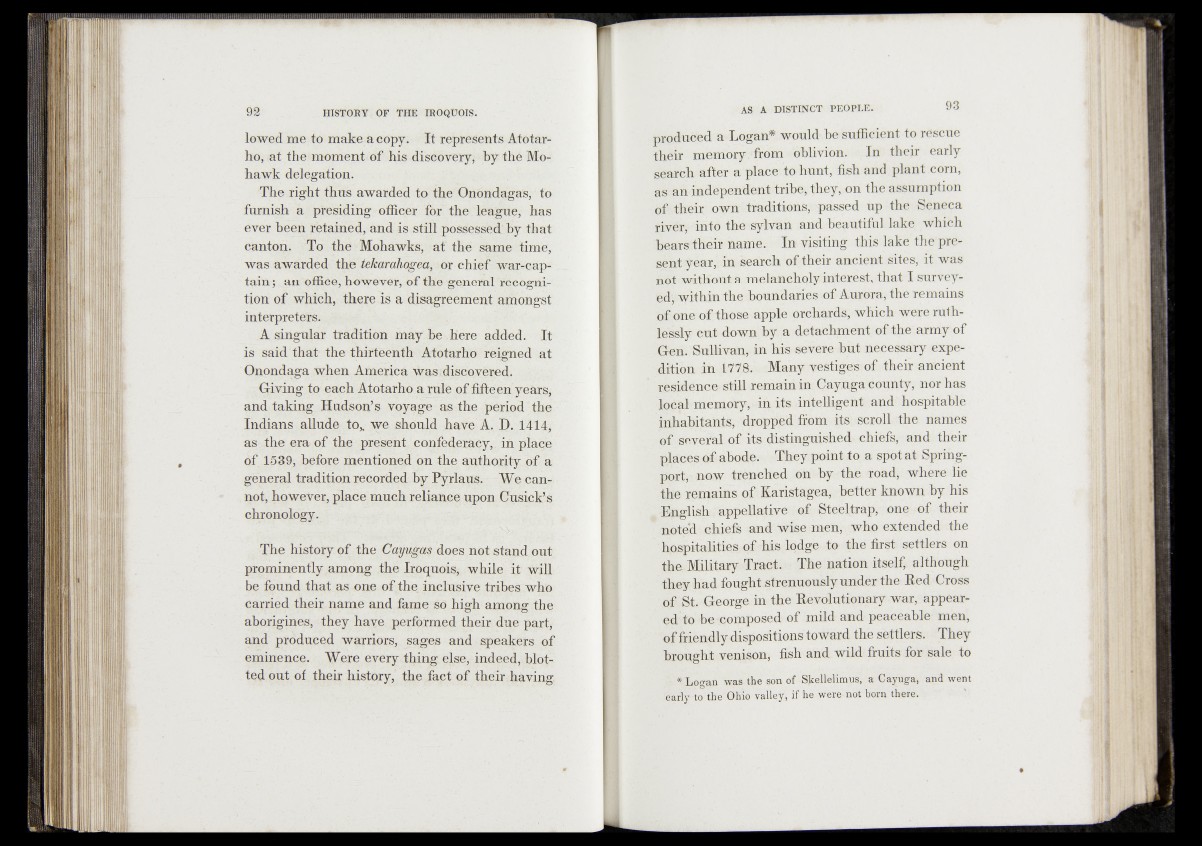
lowed me to make a copy. It represents Atotar-
ho, rat the moment of his discovery, by thé Mohawk
delegation.
The right thus awarded to the Onöndagas, to
furnish a presiding officer for the league, has
ever been retained, and is still possessed: by that
canton. To the Mohawks,: af the same time,
was awarded the tekarahogea, or chief War-captain;
an office, however, of the general fècogni-
tlon of which, there is a disagreement amongst
interpreters.
A singular tradition may be , here added. It
is said that the thirteenth Atotarho reigned at
Onondaga when America was {.discovered.
Giriving to each Atotarho a rule rof ffteen years,
and taking Hudson’s voyage a« the .period tifo
Indians allude to* we should have A.' D. 1414,
as the era of the present, confederacy, in place
of 153% before mentioned on the authority of a
general tradition recorded by Pyrlaus. Wêcan->
not, however, place much reliance upon Ciisiek’s
clnronology.
The history of the Cayugas does not stand out
prominently among rthé Iroquois, while ft will
be found that. as one of the. inclusive , tribes who
carried their name and fame so high amongr the
aborigines, they hayè performed their due party
and produced warriors, sages and speakers of
eminence. Were every thing else, indeed, blotted
out of . their history, the fact of their.having
produced a Logan* would be sufficient to rescue
their memory , from oblivion. In their early
search after a place to hunt, fish and plant corn,
as an independent tribe, they, on the assumption
of their own traditions, 'passed up the Seneca
river, into the sylvan and beautiful lake which
bears their name. In visiting this lake the present
year, in search of their ancient sites, it was
not without a melancholy interest, that I surveyed;:
within the boundaries ^of Aurora, the remains
of one of those apple orchards, which were ruthlessly
cut down by a detachment of the army of
Gen. Sullivan, in his-severe but necessary expedition
in .Many vestigesmf their ancient
residence still remain m.CayUga county, nor has
local-memory, in its intelligent and' hospitable
inhabitants, dropped from its scroll the names
/©f -tScyerai-of Its distinguished* chiefs, and their
places of abode. They point to a spot at Spring-
port,-now trenched on-by the road, where lie
the remains of Karistagea, better known by his
. English$ appellative of Stefeltrap, one of their
noted chiefs and wise men, who extended the
hospitalities of his lodge- to- the first settlers on
the-Military Tract. The nation itself, although
they had fought strenuously under the Red Cross
of Sti George in the Revolutionary war,; appeared
to be-composed of mild and peaceable men,
of friendly dispositions toward the settlers. They
brought venison* fish and wild fruits for sale to
i *>; Logan was the son of-SJtellelimus, a Cayuga» and went
Wrly-to alleys if he were.net born there.